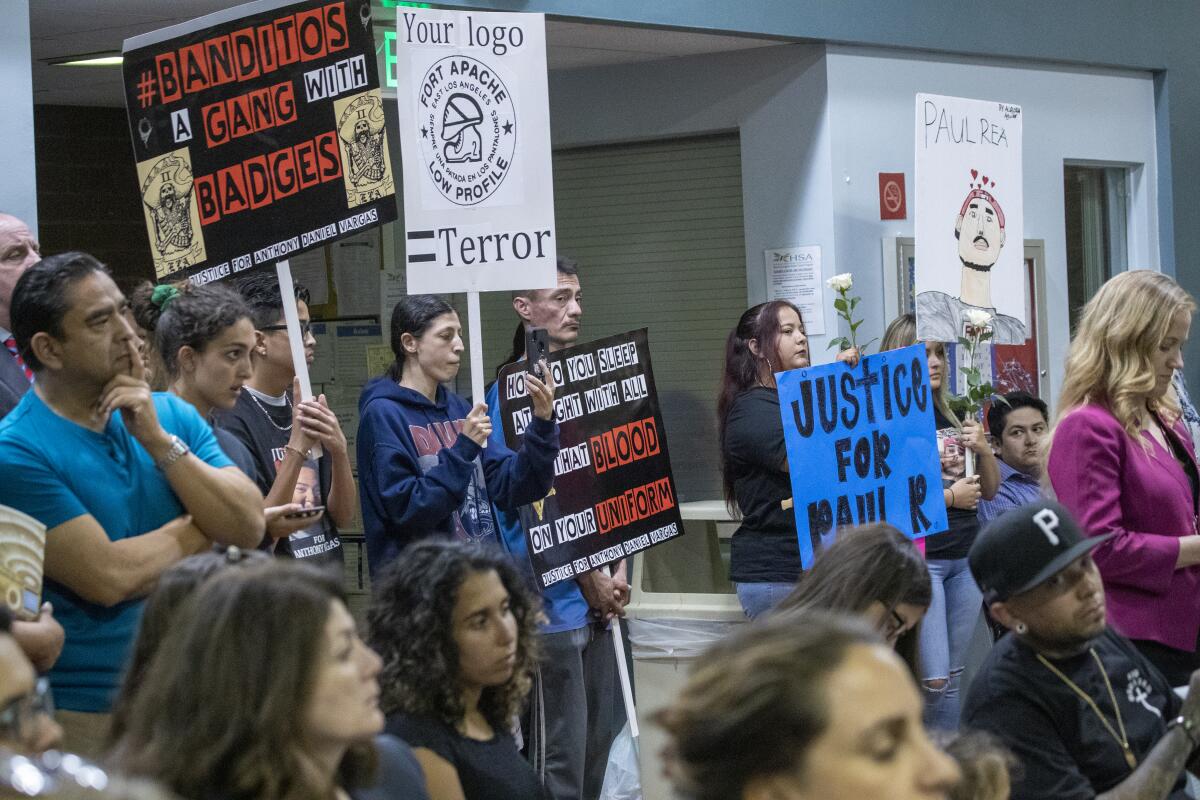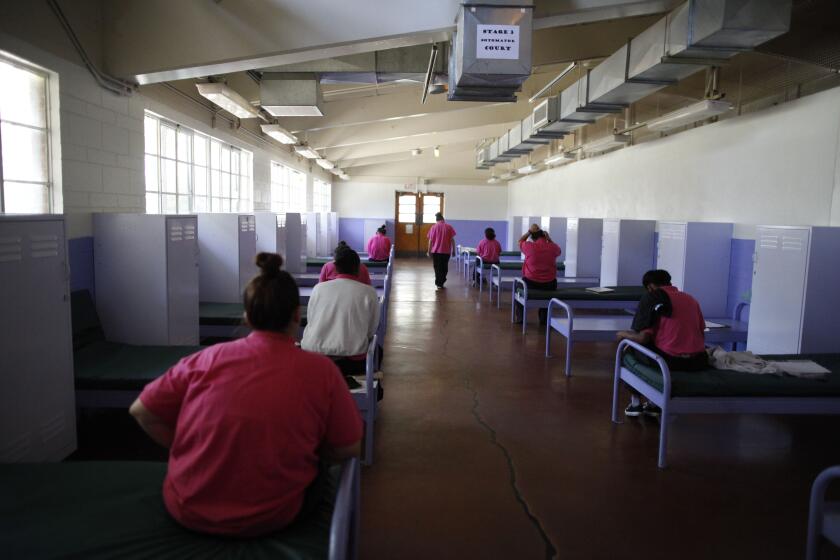L.A. County sheriff’s watchdog might gain subpoena power for investigating deputy gangs

- Share via
The chief watchdog for the Los Angeles County Sheriff’s Department has typically relied on cooperation from the law enforcement agency to obtain documents and access to internal department data.
Now, the county Office of Inspector General is one step closer to gaining a much more powerful tool.
The county Board of Supervisors voted unanimously Tuesday to explore how to grant the inspector general subpoena power — a legal mechanism that would allow the office to compel information from the Sheriff’s Department related to secret societies of deputies who wear matching tattoos.
The expanded authority would also potentially enable the inspector general to force the department to provide access to its facilities, hand over records and make its employees available to speak about other topics.
Sparked by a request from Inspector General Max Huntsman, the motion directs the county’s attorneys to develop recommendations for giving subpoena power to Huntsman’s office and report back in 90 days. The initiative also seeks to expand his office’s authority in general to investigate inked deputy clubs.
The move marks an escalation in the inspector general’s dealings with the Sheriff’s Department, whose leader, Sheriff Alex Villanueva, has sought to distance his agency from political influence from watchdogs and county supervisors. Villanueva has suggested the department under his predecessor, Jim McDonnell, may have given the inspector general’s office too much access to sensitive department matters.
Huntsman told the Board of Supervisors on Tuesday that since Villanueva took office in December, the Sheriff’s Department has cut off his staff members’ access to documents that his employees rely on to monitor the department.
“I was hired in part to tell you if we ever faced a Tanaka-level crisis again. We face it now,” Huntsman told the supervisors, referring to former Undersheriff Paul Tanaka, who was convicted of conspiracy and obstructing an FBI investigation into jail abuse and is now in prison. Tanaka was said to encourage deputies to work in the “gray area” of policing and dismissed efforts to hold deputies accountable.
Huntsman accused Villanueva of displaying a “bunker mentality” that promotes secrecy in the department. He said the new sheriff’s administration has repeatedly violated a county ordinance that governs his office’s authority to monitor the department.
“Background checks for incoming deputies appear to have been radically scaled back and the administration has refused to allow us to monitor the hiring process and ignored our document requests,” Huntsman said. “After we began reporting on the administration’s shutting down internal investigations, in violation of its own policies, the response was not to correct the violations, but to throttle back our computer access to those records.”
Huntsman also cited emails from Sheriff’s Department supervisors directing their staff to not cooperate with his office.
The inspector general also blamed past sheriffs, saying the deputy gang problem proliferated for 50 years because department managers “purposefully” opted not to investigate the subculture as a whole, choosing to focus on isolated instances of misconduct instead.
The Sheriff’s Department did not respond to requests for comment about the vote and comments made before the board on Tuesday.
The motion by Supervisors Janice Hahn and Mark Ridley-Thomas referred to reports that the FBI is investigating the Banditos, a clandestine gang of tattooed deputies at the Sheriff’s Department’s East Los Angeles station as well as similar groups at other stations. The Times reported earlier this month that FBI agents have been interviewing deputies about whether the clubs encourage or require members to commit crimes such as planting evidence or writing false incident reports.
The secretive deputy groups are part of a deeply entrenched subculture within the Sheriff’s Department that stretches back decades. Deputies generally must be invited to join the exclusive clubs, whose members brand themselves with tattoos that often include skull designs and a unique number denoting the deputy’s place in the lineage of lawmen in the fellowship. The groups are said to extract taxes, disguised as fundraisers for good causes, from other deputies.
The clubs’ members have been accused of seeing themselves as hard-core officers who practice aggressive policing. Defenders say the cliques are healthy brotherhoods that boost morale, likening them to close-knit groups in the military.
Shootings, uses of force and other actions by deputies who are members of the groups have cost county taxpayers millions in lawsuits over the last several decades.
“These secret societies are a dangerous problem. They not only erode public trust in law enforcement and undermine the chain of command, we are concerned that they promote racism, sexism and violence,” the board’s motion says. “The menacing names of these secret societies — Banditos, Reapers, Spartans, Regulators and Vikings — may exist to intimidate not only other deputies but the general public as well.”
Several members of the public praised the board’s motion, including James Nelson, an organizer with Dignity and Power Now, a group that advocates for incarcerated people and their families. Nelson said the discussion was long overdue but argued against using euphemisms such as “cliques” to describe what he said are gangs of deputies.
“There are gangs in there. For so long there was no transparency as far as identifying them as gangs. They want to be a ‘secret society’ or a ‘clique’ or something like that. Call it for what it is,” said Nelson, who said he is a former gang member who has suffered violence by deputies in the county jails.
The motion reflects growing public pressure to empower oversight groups with more tools to hold the Sheriff’s Department accountable.
An initiative that will appear on the 2020 ballot in Los Angeles County would give the Sheriff Civilian Oversight Commission the ability to issue subpoenas to the Sheriff’s Department.
A separate statewide effort to give oversight groups subpoena power to monitor sheriffs is winding through the Legislature. Assembly Bill 1185 would make clear that county supervisors have the power to create oversight bodies for sheriff’s departments and give those commissions subpoena authority. The bill passed the Assembly and is set to be considered by the Senate later this year.
Also on Tuesday, the Sheriff Civilian Oversight Commission adopted a resolution to call for the immediate removal of a logo featuring an image of a boot with a riot helmet at the Sheriff’s Department’s East L.A. station. The symbol — which refers to the station as “Fort Apache” and includes a phrase in Spanish that translates to “Always a kick in the pants” — was banned by McDonnell but reinstated by Villanueva not long after he took office.
“The Fort Apache seal portrays riot gear and mottos that, in context, may suggest that the East Los Angeles sheriff station is a lone outpost where deputies are at war with the local communities that they serve,” the commission’s resolution says.
The resolution also notes that numerous community members find the logo culturally insensitive. While not associated with the Banditos, the symbol is often brought up in discussions about tribalism and imagery in the department that some members of the public view as problematic.
Villanueva, who served at the East L.A. station for seven years as a patrol deputy, has defended the image as a source of pride.
Times staff writer Anita Chabria contributed to this report.
More to Read
Sign up for Essential California
The most important California stories and recommendations in your inbox every morning.
You may occasionally receive promotional content from the Los Angeles Times.











